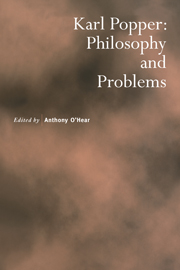Book contents
- Frontmatter
- Contents
- Introduction
- Popper, Science and Rationality
- Popper and Reliabilism
- The Problem of the Empirical Basis
- ‘Revolution in Permanence’: Popper on Theory-Change in Science
- Popper's Contribution to the Philosophy of Probability
- Propensities and Indeterminism
- Popper on Determinism
- Popper and the Quantum Theory
- The Uses of Karl Popper
- Popper and Darwinism
- Popper and the Scepticism of Evolutionary Epistemology, or, What Were Human Beings Made For?
- Does Popper Explain Historical Explanation?
- The Grounds for Anti-Historicism
- What Use is Popper to a Politician?
- Ethical Foundations of Popper's Philosophy
- Works of Karl Popper Referred to in the Text
- Notes on Contributors
- Index
Popper, Science and Rationality
Published online by Cambridge University Press: 19 January 2010
- Frontmatter
- Contents
- Introduction
- Popper, Science and Rationality
- Popper and Reliabilism
- The Problem of the Empirical Basis
- ‘Revolution in Permanence’: Popper on Theory-Change in Science
- Popper's Contribution to the Philosophy of Probability
- Propensities and Indeterminism
- Popper on Determinism
- Popper and the Quantum Theory
- The Uses of Karl Popper
- Popper and Darwinism
- Popper and the Scepticism of Evolutionary Epistemology, or, What Were Human Beings Made For?
- Does Popper Explain Historical Explanation?
- The Grounds for Anti-Historicism
- What Use is Popper to a Politician?
- Ethical Foundations of Popper's Philosophy
- Works of Karl Popper Referred to in the Text
- Notes on Contributors
- Index
Summary
We all think that science is special. Its products–its technological spin-off–dominate our lives which are thereby sometimes enriched and sometimes impoverished but always affected. Even the most outlandish critics of science such as Feyerabend implicitly recognize its success. Feyerabend told us that science was a congame. Scientists had so successfully hood-winked us into adopting its ideology that other equally legitimate forms of activity–alchemy, witchcraft and magic–lost out. He conjured up a vision of much enriched lives if only we could free ourselves from the domination of the ‘one true ideology’ of science just as our ancestors freed us from the domination of the Church. But he told us these things in Switzerland and in California happily commuting between them in that most ubiquitous product of science–the aeroplane.
We are so impressed in general with the results of science that we give quite amazing credibility to any claim that is successfully represented as being the result of a scientific investigation. As an illustration one might cite the credibility given by the general educated population to claims about the origin of the universe notwithstanding the paucity of evidence and the fact that cosmological theories have a half-live of ten years or so. But my favourite example is much more mundane: it is the Ben Johnson fiasco. The entire Canadian population was convulsed with delight the night Johnson appeared to have won the gold medal in the 100 metres.
- Type
- Chapter
- Information
- Karl PopperPhilosophy and Problems, pp. 13 - 30Publisher: Cambridge University PressPrint publication year: 1996
- 1
- Cited by

